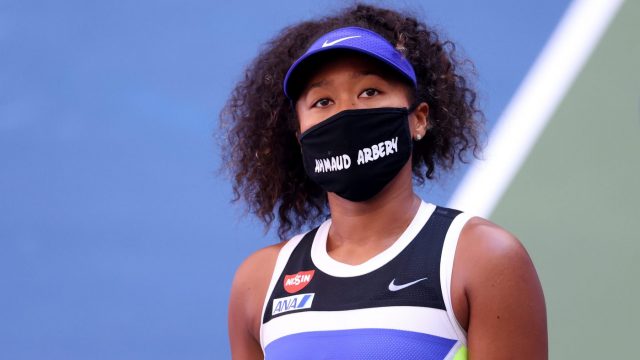
By Soraya Nadia McDonald
The Undefeated
Naomi Osaka made sure Black lives mattered as she pursued her third Grand Slam victory at the 2020 US Open.
Throughout the tournament, Osaka, 22, sported customized black face masks, each bearing the name of a different person who was killed because they were Black: Breonna Taylor, Elijah McClain, Ahmaud Arbery, Trayvon Martin, George Floyd, Philando Castile, and Tamir Rice.
The US Open made its own gesture of support for the movement for Black lives by featuring art by Black artists in the stands of a mostly empty Arthur Ashe stadium, made desolate by the coronavirus pandemic. But Osaka took individual action with her masks. Sybrina Fulton, Martin’s mother and Marcus Arbery, Ahmaud’s father, sent video messages of thanks to the No. 4-ranked player, bringing her to tears.
Saturday, Osaka defeated Victoria Azarenka, 1-6, 6-3, 6-3, notching her second US Open championship. In 2018, Osaka won her first Grand Slam against her idol, Serena Williams, in a final that was overshadowed by the officiating of Carlos Ramos, and defined by debates over race, gender and how biases about both show up in tennis. Osaka was crowned amid a sea of booing, not directed at her, but Ramos. She apologized for winning. (This year, Osaka defeated Jennifer Brady in the semifinals of the tournament this year, a match Ramos officiated.)
After her win in this year’s finals, Osaka took possession of her trophy in a stadium far quieter and emptier than it’s been in US Open history. She had spent the duration of the tournament in a bubble meant to protect players from coronavirus. But even there, the reality of how race is lived in America permeates.

“I remember Trayvon’s death clearly,” Osaka tweeted Sept. 7. “I remember being a kid and just feeling scared. I know his death wasn’t the first but for me it was the one that opened my eyes to what was going on. To see the same things happening over and over still is sad. Things have to change.”
Osaka has been vocal about social justice, specifically about fighting anti-Black racism. Osaka’s father, Leonard Francois, is Haitian. Her mother, Tamaki, is Japanese. She plays under the Japanese flag, but grew up in New York and Florida, and now lives in Los Angeles. Unlike her cohorts in the NBA, NFL, and WNBA, Osaka plays a sport that is still predominantly white, and which markets heavily to a well-heeled, country club-type of fan – one of the USTA’s biggest sponsors is Rolex. Because of the race and class dynamics of this particular atmosphere, Osaka has fielded lots of questions about racism and protest from white interlocutors. She’s also decided how to engage with race and racism as a professional athlete on her own terms, in a way that indicates precisely who she expects to do more thinking.
“You had seven matches, seven masks, seven names,” ESPN’s Tom Rinaldi said to Osaka after this year’s final. “What was the message you wanted to send?”
She responded: “Well, what was the message you got, is more the question. I feel like the point was to make people start talking.”
In August, Osaka joined professional athletes across the sports world when she released a statement that she would not be playing her semifinal match at the Western & Southern Open after a Kenosha, Wisconsin, police officer shot Jacob Blake in the back seven times. Tournament organizers paused the entire tournament and resumed play two days later, which Osaka joined.
“Before I am an athlete, I am a black woman. And as a black woman I feel as though there are much more important matters at hand that need immediate attention, rather than watching me play tennis,” Osaka wrote in a statement posted to Twitter in both English and Japanese. “I don’t expect anything drastic to happen with me not playing, but if I can get a conversation started in a majority-white sport I consider that a step in the right direction. Watching the continued genocide of Black people at the hands of the police is honestly making me sick to my stomach. I’m exhausted of having a new hashtag pop up every few days and I’m extremely tired of having this same conversation over and over again. When will it ever be enough?”
The statement marked a subtle evolution for Osaka. In January 2019, when one of her sponsors released an anime ad in which Osaka appeared with lighter skin, she addressed it in a news conference at the Australian Open.
“For me, it’s obvious, I’m tan. It’s pretty obvious. I don’t think they did it on purpose to be, like, whitewashing or anything. But I definitely think that the next time they try to portray me or something, I feel like they should talk to me about it.”

Saturday, Osaka’s boyfriend, the rapper Cordae, leapt to his feat when Osaka scored the match-winning point, sporting a T-shirt that read “DEFUND THE POLICE.” Cordae was one of 87 people arrested in Louisville, Kentucky, in July for protesting outside the home of state attorney general Daniel Cameron in an effort to convince Cameron to arrest the police who shot and killed Taylor in her own home. The same month, Osaka published an op-ed in Esquire explaining why she flew to Minneapolis to join the protests over Floyd’s death.
“I’m Asian, I’m Black, and I’m female. … I support the movement to defund the police,” Osaka wrote. “By that, I don’t necessarily mean to eradicate them altogether. Some of their funding — like payment plans to cops who have been convicted of crimes — should be re-allocated to social measures within the community: Education, housing and youth programs, which are so often neglected. We need to take a holistic approach to our communities and to keeping each other safe.”
In her video message to Osaka, Fulton told the tennis player to “continue to do well. Continue to kick butt.” Osaka took up the challenge and fulfilled it. As she has embraced the idea of being a “vessel” for those slain because of racism, Osaka has grown more sophisticated in how she discusses race, and she’s become more comfortable with doing so publicly.
“I’ve read a lot into Haitian history,” Osaka said Saturday during a postmatch news conference when I asked what has been informing her activism. “My dad always talks about that. My boyfriend’s really into reading a lot, so he’s been passing me books. … I try not to get most of my information from the news. I try to form my own opinion.”




